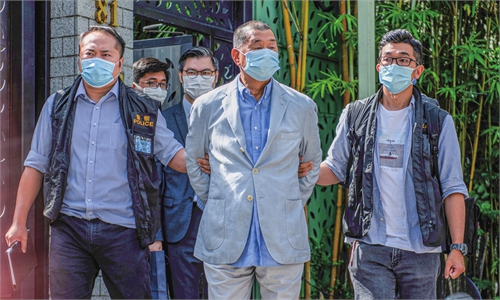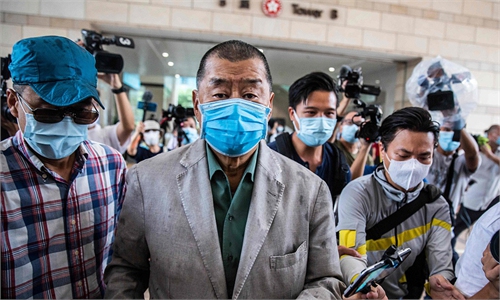HK top court reserves ruling on controversial decision of allowing UK lawyer to represent Jimmy Lai in national security trial

Jimmy Lai File Photo: AFP
The top court of the Hong Kong Special Administrative Region (HKSAR) on Friday reserved a ruling on local prosecutors' last-ditch attempt to prevent jailed Apple Daily founder Jimmy Lai Chee-ying from hiring a UK lawyer for his upcoming high-profile national security trial.
It is the latest move of the twists and turns since a local court approved the foreign lawyers' engagement, which had triggered strong concerns among local law professions and authorities in consideration of risk of national secrets leakage.
The Court of Final Appeal of Hong Kong on Friday reserved the decision till Monday - three days before Lai's trial - on whether to overturn the permission granted to London-based King's Counsel Timothy Owen to join Lai's defense team, the South China Morning Post reported.
Lai, 74, will stand trial before a panel of three High Court judges on December 1 on two counts of conspiracy to collude with foreign forces and one similar charge of collusion under the national security law (NSL) for Hong Kong, according to Hong Kong media outlets.
Lai's lawyers reportedly engaged the services of Owen in early August. In October, Chief Judge of the High Court Jeremy Poon Shiu-chor approved Owen's participation.
Hong Kong's Department of Justice appealed against the decision but the Court of Appeal on November 9 announced to uphold the decision.
Hong Kong-based law professions reached by the Global Times on Friday reiterated that it goes against the aim of the establishment of the NSL for Hong Kong and the interest of the Hong Kong public to allow a foreign lawyer to get involved in NSL-related cases, especially taking into account the risk of national secrets leakage.
Wu Yingpeng, member of the Election Committee and secretary-general of Hong Kong Basic Law Education Association, told the Global Times that Jimmy Lai's case is special compared with other criminal cases and foreign lawyers should not get involved.
During the judicial process, the prosecutors have to expose all relevant materials they obtained to the defense side, including those that will not be used in the prosecution. Although a foreign lawyer has the industry ethics to keep secrets, it cannot be guaranteed that he would not release these secrets when faced with political pressure after he returns to his own country. In that scenario, it will be hard for us to hold him accountable, according to Wu.
Wu noted that safeguarding national sovereignty is the highest principle of the One Country, Two Systems policy. It is the HKSAR's constitutional responsibility to safeguard national security and all regional governmental institutes including the judicial organs shoulder the legal responsibility to guard against harm to national security, he said.
Willy Fu, a law professor and vice-chairman of the Hong Kong Legal Exchange Foundation, echoed Wu. Fu noted that it is also possible that Owen might withdraw from the trial halfway through due to the pressure form his own country, which will be unfair to his client and wastes the court's time.
Lai's case is very localized. The laws involved are mainly the NSL, the Basic Law and the Hong Kong local criminal law. Therefore, Hong Kong local lawyers should be considered first. And I believe we have local lawyers who are capable enough to deal with the case, Wu noted.
Using local lawyers for the case will also help promote the development of local legal laws and protect the local public's interest, Wu said.
Hong Kong used to have a tradition to allow foreign lawyers to come to Hong Kong to assist Hong Kong courts understand some certain cases and share with the courts their experiences and points of laws, Fu said.
But NSL-related crimes are unique. The NSL is based on the continental legal system and originally formulated in Chinese. It is not likely that Owen can 100 percent understand the law after it was translated into English, Fu noted.
Former chief executive Leung Chun-ying said on Facebook on November 10 that it was "ridiculous" for someone accused of colluding with external forces to be represented by a lawyer from abroad.
Leung, who is now vice chairman of the National Committee of the Chinese People's Political Consultative Conference, said the ruling by the Court of Appeal was a slap in the face to Hong Kong lawyers.
Apple Daily, a secessionist tabloid in Hong Kong, issued its final hard copy in late June. This was seen as a significant event that put an end to an era when foreign proxies and secessionist forces could recklessly meddle in China's internal affairs by cultivating agents, like the paper's founder Jimmy Lai and his media group.
In accordance with the NSL for Hong Kong, Jimmy Lai and six other people with the newspaper are facing charges of colluding with foreign forces to jeopardize national security, as well as printing, publishing, distributing, displaying, or copying inflammatory publications.
The other six former executives of Apple Daily were Cheung Kim-hung, who was chief executive of the newspaper's former owner Next Digital, Apple Daily's former associate publisher Chan Pui-man, former editor-in-chief Ryan Law, former executive editor-in-chief Lam Man-chung, former English edition editor-in-chief Fung Wai-kong and former editorial writer Yeung Ching-kee.
They pleaded guilty to conspiring with Lai and other people to request a foreign country or organization "to impose sanctions or blockade, or engage in other hostile activities" against the Hong Kong SAR and Chinese governments between July 2020 and June 2021.




